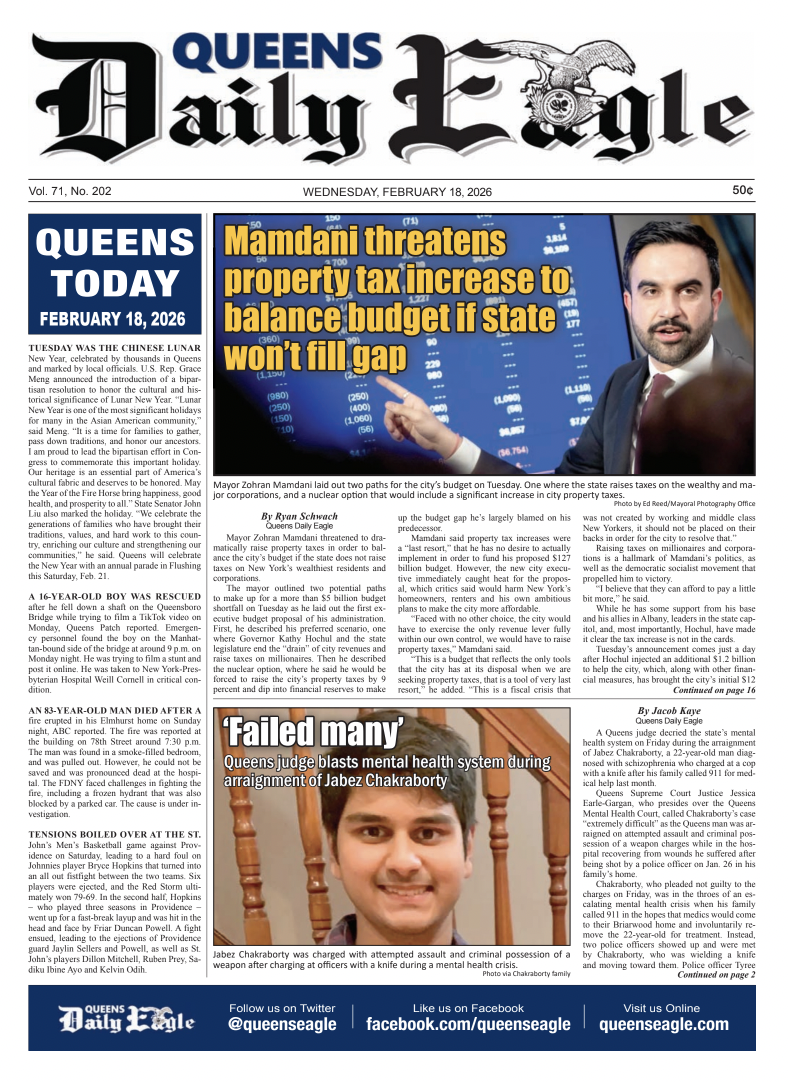Ex-Queens prosecutor who kept non-whites off juries is now NYC PBA lawyer
/The Queens County Criminal Court building. Eagle file photo by David Brand
By David Brand
A former Queens prosecutor who sought to eliminate Black, Latino and female New Yorkers from jury pools in the 1990s has spent the last 13 years as legal counsel to the New York City Police Benevolent Association, records show.
Ex-Assistant District Attorney Christopher J. McGrath relied on handwritten notes reminding him to pick white jurors and to use his limited number of “peremptory strikes” to eliminate women, people of color and a host of ethnicities from jury pools in at least two trials in 1996, Queens District Attorney Melinda Katz said at a court hearing Thursday.
McGrath’s papers included instructions to pick “established whites,” Black jurors from “Good B neighborhoods” and “no Hispanics” and rated neighborhoods by their likelihood to produce jurors favorable to the prosecution based on race or ethnicity.
The discovery of the notes and McGrath’s admission to using them during jury selection prompted Katz to recommend vacating two convictions — one for a double murder and another for the close-range shooting of a cop — and to launch a full review of McGrath’s case history.
A Queens judge agreed, overturning both convictions Thursday as a result of what he termed McGrath’s “abhorrent cheat sheet.”
But McGrath long ago moved on from his career as an assistant district attorney in Queens.
In February 2007, he began working for the NYCPBA as associate general counsel. He earned $231,848 in 2018, the organization’s IRS filings show.
McGrath left the Queens DA’s office by 1998 after ten years as a prosecutor, according to a short bio in paperwork submitted to the federal Securities and Exchange Commission by a Connecticut shipping company. McGrath was nominated as a member of the company’s board of directors in 2007.
In his role as police union lawyer, McGrath “possesses responsibility for pension disability and investment legal functions as they relate to the union leadership’s responsibilities as trustees to the Police Pension Fund, the multi-billion dollar retirement system of New York City Police Officers,” according to the company’s SEC application.
In between the DA’s Office and the PBA, McGrath spent five years as a personal injury lawyer in private practice and three years as senior trial counsel for the Harleysville Insurance Company, the document states.
Records show that McGrath performs a range of duties for the PBA, such as representing 9/11 first responders who seek compensation and drafting statements for PBA officials to read at City Council hearings. In 2011, he represented the widow of a Queens cop who died of cancer after working for about 350 hours at Ground Zero and the Fresh Kills Landfill following the Sept. 11 terror attack.
Neither McGrath nor the NYC PBA responded to requests for comment for this story, but the various documents and three former colleagues familiar with McGrath’s career confirm his position with the police union. The Queens DA’s Office did not respond to requests for comment.
The discriminatory notes that McGrath used at jury selection have raised major concerns among justice reform advocates and members of the Queens legal community.
A Freedom of Information Law request for the two defendants’ case files turned up photocopies of the papers, compelling Queens’ new Conviction Integrity Unit to begin investigating the cases in January with support from the law firm Covington Burling. McGrath confirmed using the notes during an interview with CIU staff.
Prosecutors and defense attorneys are allowed some peremptory strikes to automatically eliminate jurors from the pool of potential panelists, but they are not permitted to exclude a person based on their race, ethnicity or gender.
The revelation of McGrath’s misconduct has so far led to the reversal of two violent crime convictions.
Katz consented to overturning the convictions of Santiago Valdez, who was found guilty of the 1993 killing of nightclub patrons Danny Velez and Arley Zapata, and Paul Morant, who was convicted of attempted murder for shooting NYPD Officer Keith Schweers during a stop in 1995. A bulletproof vest saved Schweers’ life.
Katz said she plans to retry both cases. The men were released from upstate prisons and remanded to Rikers Island to await their new trials Thursday.
The Queens DA’s Office will next review eight additional convictions prosecuted by McGrath, plus every other case he tried during his decade as an assistant district attorney, Katz said.
Queens Administrative Judge Joseph Zayas presided at the hearing Thursday and described McGrath’s racist “cheat sheets” as “a smoking gun evincing pernicious and invidious discrimination clearly designed to eviscerate the constitutional right to be tried by a jury of one’s peers.”
In addition, to the explicitly racist directives like “No Hispanics,” the notes advised McGrath against choosing “mother types” or “grandmotherly types.”
“Don’t want to[o] many females,” the notes said, along with “Greeks drop everybody” and “No Italians if D[efendant] is Italian.”
The instructions also included a list of Queens neighborhoods, with each given a 0 to 5 rating based on a perception of how favorable residents would be to the prosecution. Various neighborhoods that were predominantly white in 1996, like Glendale, Ridgewood and Maspeth, had the word “Yes” underlined above them. Zayas said other notes imply that prosecutors “should try to avoid Blacks from other ‘bad’ parts of Queens County” when picking a jury
He questioned how many other times McGrath had used the notes.
"Even more troublingly,” Zayas added, “he may not have been the only assistant district attorney using the discriminatory cheat sheet to select juries in Queens County.”




